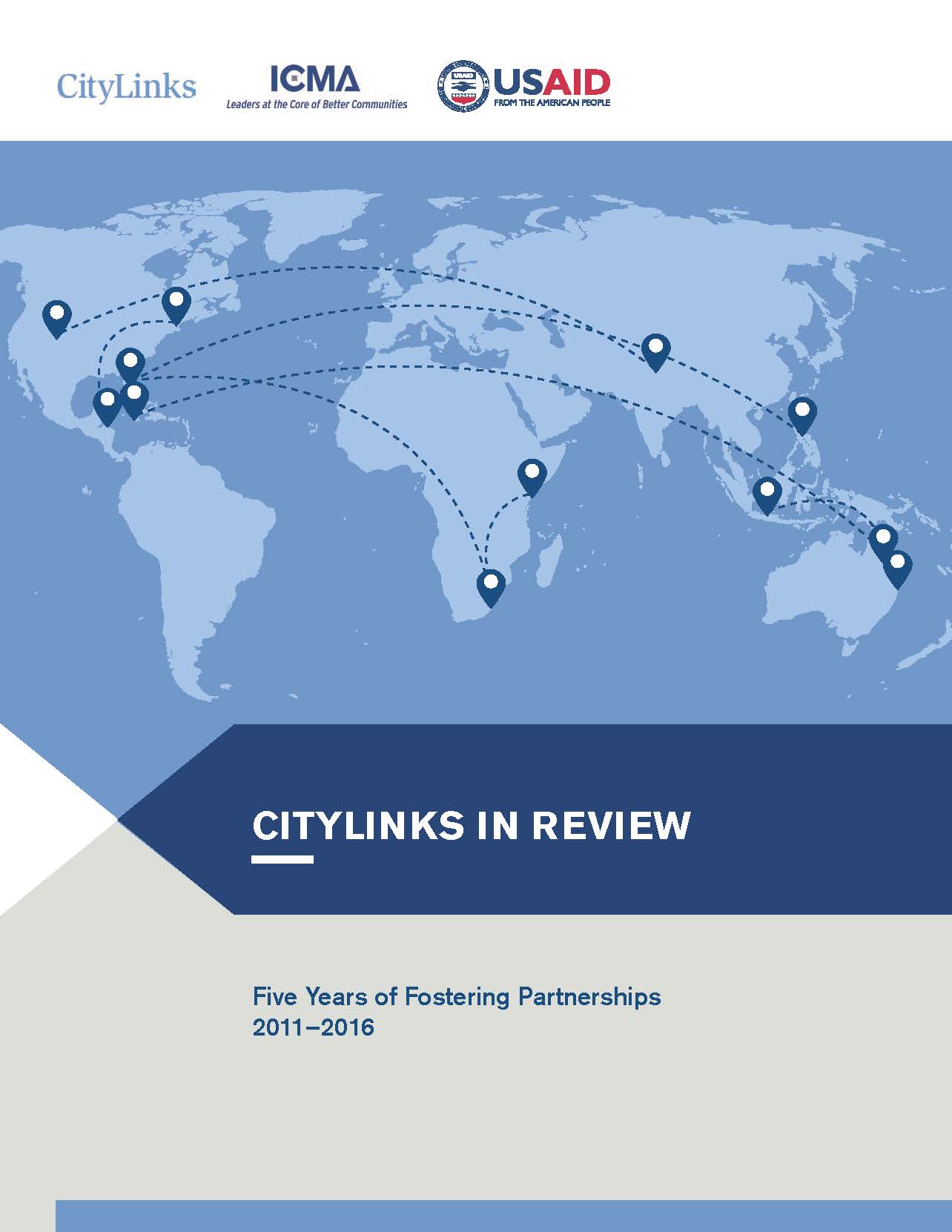
Washington, D.C.—ICMA, the International City/County Management Association, today released CityLinks in Review: Five Years of Fostering Partnerships, 2011-2016, a compilation of recommendations and lessons learned from eight municipal resilience projects that demonstrate the power of cities learning from one another. ICMA implemented these city-to-city partnerships through funding from the U.S. Agency for International Development (USAID).
As economic engines of the countries in which they reside, local governments are a force to be reckoned with on the global stage, with implications far beyond their geographical borders. CityLinks in Review focuses on how cities use peer-to-peer learning partnerships to develop tools to tackle water sector challenges, address the effects of climate change and devise adaptation strategies, strengthen violence prevention through environmental design, and achieve other longer-term objectives.
The CityLinks™ Partnership Model
CityLinks™ is a trademarked methodology designed by ICMA to enable municipal officials in developing and decentralizing countries to draw on the resources of their international counterparts. The program—which involves a series of exchange trips—is based on the premise that well-managed cities are the key to efficient service delivery, economic growth, sound management of resources, and political stability.
ICMA launched the CityLinks program in 2003 with a five-year program grant from USAID that was renewed in 2011. The program is based on the success of the inaugural Resource Cities program, which ICMA and USAID established in 1997, and focused on a range of local government challenges, including
- Improving basic public services provided to citizens, including infrastructure development; water, sanitation, and other environmental management services; and crime prevention and public safety;
- Enhancing local economic competitiveness by identifying opportunities, developing strategies, and planning for implementation;
- Creating effective municipal management structures for strategic planning, financial management, performance measurement, citizen participation, and advocacy; and
- Honing the skills of local government officials to enable them to better carry out their mandates.
Major Accomplishments
As a result of CityLinks’ work throughout the world, more than 170 institutions and 300 stakeholders improved their capacity to address climate change issues. Major accomplishments highlighted in CityLinks in Review include
- Piloting of the first App2Action Challenge, which brought together software developers, designers, and subject-matter experts to develop phone and web-based tools that helped address water sector challenges in Nablus Municipality.
- Establishing the Central KwaZulu-Natal Climate Change Compact in Durban, South Africa, which was modelled on the Southeast Florida Regional Climate Change Compact.
- Creating a climate change planning tool in La Ceiba, Honduras, that provides different types of adaptation strategies for land use services in accordance with the required sectoral need or critical systems, including physical infrastructure, social and human systems, natural systems, and economic systems.
- Establishing a partnership between Semarang, Indonesia, and Diponegoro University, which enabled the city to use, develop, and run predictive coastal models and to investigate how climate change will impact the city’s inundation problems.
- Adopting standard operating procedures in Shimla, India, to increase the resiliency of water distribution and management centers.
To learn more about the partnerships and resources created under this unique ICMA program, read the entire CityLinks in Review collection or visit ICMA’s CityLinks website. Additional case studies and resources are also available in the CityLinks Primer on Subnational Approaches for Low Emission, Climate Resilient Development, which provides an introduction to the key principles and practices of low carbon, climate resilient development.
About ICMA
ICMA, the International City/County Management Association, advances professional local government worldwide. Our mission is to create excellence in local governance by developing and fostering professional management to build livable communities that improve people’s lives. ICMA provides support; data and information; peer and results-oriented assistance; and training and professional development to more than 11,000 city, town, and county experts and other individuals and organizations throughout the world. The management decisions made by ICMA's members affect millions of people living in thousands of communities, from small villages and towns to large metropolitan areas.
About USAID
The U.S. Agency for International Development (USAID) is the principal U.S. agency to extend assistance to countries recovering from disaster, trying to escape poverty, and engaging in democratic reforms. U.S. foreign assistance has always had the twofold purpose of furthering America's interests while improving lives in the developing world. The Agency carries out U.S. foreign policy by promoting broad-scale human progress at the same time it expands stable, free societies, creates markets and trade partners for the United States, and fosters good will abroad.
New, Reduced Membership Dues
A new, reduced dues rate is available for CAOs/ACAOs, along with additional discounts for those in smaller communities, has been implemented. Learn more and be sure to join or renew today!
